CALL FOR COMMUNICATION “CONFCAYS2019” (First conference of CAYS)
Background and rationale
The evidence, according to which the future is built in the development of science, today calls for the involvement of young people in development efforts as agents of innovation and change.
This is no less an “alert” to young Cameroonian scientists whose brilliance and distinction for advancing science are recognized at the national, regional, continental and even global levels. Their involvement is essential for the development of Cameroon. The delay in development experienced by Africa, a continent with undeniable intellectual, natural and human resources, shows the urgency to encourage cooperation likely to help it in order to propel it resolutely towards emergence. The idea of collaboration and various partnerships between national and international institutions or entities therefore finds its relevance in an international context where autarky is an attitude of intellectual suicide. Many challenges stand out, including funding, environmental management and research management. To this is undoubtedly added the problem of mentoring for young scientists, which rhymes with the need to remedy the crucial problem of benchmarks useful to the youth of Africa. The first conference of the Academy of Young Scientists of Cameroon, CONCAF2019 will be preceded by a Training Workshop on the Scientific Council on the theme: “Scientific Council in Africa: opportunity or illusion ”, organized from 25 to 26 August 2019, in collaboration with the Fonds de Recherche du Québec (FRQ) and the International Network of Scientific Council to Government ( International Network for Government Science Advice or INGSA).
Its general objective is: “To develop and strengthen the capacities of researchers, academics and experts to use the concept of scientific advice to government for better aid in decision-making and appropriation of public policies”.
Appearing as a platform for networking, exchange and discussion, the CONFCAYS2019 will bring together the various players in civil society and scientists around various themes, and will undoubtedly create emulation in terms of national and international cooperation in order to federate ideas into projects.
Eligibility criteria
This conference is centralized on multidisciplinary and interinstitutional research which requires the participation of young scientists or mid-career scientists who will be able to contribute in the fields of the three colleges of CAYS (Biological Sciences, Mathematical and Physical Sciences, Social Sciences). The sessions will thus focus on the following themes:
- Nutrition, Health and Environment;
- Materials Science, ICT and Renewable Energy;
- Digital Economy, Peace and Development.
Organization
The conference will last two days and will be structured as follows:
- Plenary sessions (duration 45min with 30min of presentation and 5min discussion);
- Discussion panels (duration 1h15 min with 50min presentation and 25 min discussion);
- Parallel sessions (duration 25 min per candidate including 15 min presentation and 10 min
discussion).
Submission procedure
The deadline for submitting the registration form is: April 20, 2019
Applicants must submit their article or summary via the online platform ( www.cayscam.com )
The language of the conference is French and / or English.
Scientific committee (Training workshop & CONFCAYS 2019)
1) Prof Beban Sammy CHUMBOW, University of Dschang-Cameroon;
2) Prof Innocent Afuh AWASOM, University of Texas-USA;
3) Prof Jean LIYONGO, University of Kinshasa – Democratic Republic of Congo;
4) Prof Madiagne DIALLO, Economic and Social Council-Senegal;
5) Prof. Moussa AG ARYA, Abdou Moumoumi University of Niamey-Niger
6) Prof Paul WOAFO, University of Yaoundé I-Cameroon;
7) Prof Pius Wuchu AKUMBU, University of Buea -Cameroun;
8) Prof Remi QUIRION, Quebec-Canada Research Fund;
9) Prof Rokia SANOGO, University of Technical and Technological Sciences of Bamako-Mali
10) Prof Siméon Pierre CHOUKEM, University of Dschang-Cameroon;
11) Prof Timpoko KIENON,Félix Houphouët-Boigny University of Cocody Abidjan-Côte D’Ivoire;
12) Prof Wilfred MBACHAM, University of Yaoundé I-Cameroon;
13) Dr. Arrey TARKANG PROTUS, Ministry of Scientific Research and Innovation – Cameroon ;
14) Dr. Brice TCHAKAM KAMTCHUENG, Institute of Geological and Mining Research-Cameroon;
15) Dr. Christian Daniel BEYEME, Ministry of Higher Education-Cameroon;
16) Dr. Christian Lambert NGUENA, University of Dschang-Cameroon;
17) Dr. David MBAH, Academy of Sciences-Cameroon;
18) Dr. Felix ASSAH KEMBE, University of Yaoundé I-Cameroon;
19) Dr. Godswill TSOMBOH, Institute of Agronomic Research and Development-Cameroon;
20) Dr. Habil. Faithful NTIE-KANG, University of Buea-Cameroon;
21) Dr. Hugues C. NANA DJEUNGA, Research on Filariasis and other Tropical Diseases – Cameroon .
22) Dr. Jimmi Hervé TALLA MBE, University of Dschang-Cameroon;
23) Dr. Jude NDZIFON KIMENGSI, CATUC Bamenda-Cameroon;
24) Dr. Loveline Kongla NSAHLAI, University of Yaoundé-Cameroon;
25) Dr. Néhémie DONFAGSITELI, Institute of Medical Research and Medicinal Plants-Cameroon;
26) Ms. Brïte PAUCHET, Quebec-Canada Research Fund;
27) Mr. Ildevert EWONDO, Ministry of Higher Education-Cameroon.
Organizing committee (Training workshop & CONFCAYS 2019)
Justine Germo NZWEUNDJI (MINRESI / IMPM-Cameroon); Joséphine NGO MBING (University of Yaoundé I-Cameroon); Christian-Lambert NGUENA (University of Dschang-Cameroon);
Gabriel LONI (Center for Biotechnology-Cameroon); Jean Aimé MBEY (University of Yaoundé ICameroun); Jimmi TALLA MBE (University of Dschang-Cameroon); Paul ANIMBOM (University of Bamenda-Cameroon); Hugues NANA DJEUNGA (CRFilMT-Cameroon); Mengnjo Jude WIRMVEM (Institute of Geological and Mining Research-Cameroon); Magellan FOKENG GUEWO (Center for Biotechnology-Cameroon); Hamadou BOUKAR (University of Ngaoundéré-Cameroon); Maï DJANGO WAMBE Thérèse (University of Ngaoundéré-Cameroon); Serge NZALI (University of Dschang-Cameroon).


